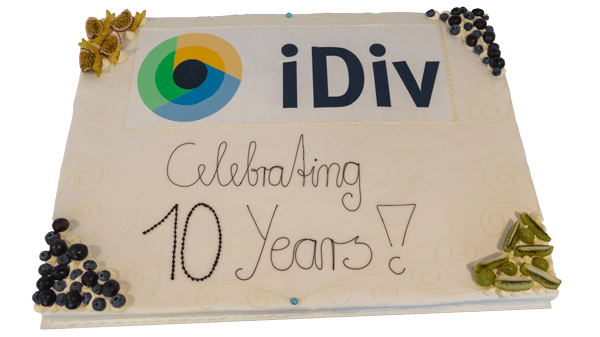sDiv newsletter November 2022 | Spotlight on

A short reflection of the first 10 years of sDiv - Impact needs time
Dear colleagues,
Basically, on this exact day when you find this newsletter in your inbox, I started my job as head of sDiv 10 years ago and so sDiv started to operate. 2022 is the 10th year of iDiv’s and thus sDiv’s existence. Looking back on these 10 extremely exciting but also demanding years, some activities nowadays become “business as usual” (e.g. coordinating the 17th call with sDiv involvement - see & please circulate the advertisement of our open call and/or apply!). Other activities are still new, while we are constantly working on improving our services. For example, we are still trying to find the best ways to support synthesis projects and colleagues that focus on topics relevant to underrepresented research regions (see open call on this) while being relevant and appealing to iDiv’s researcher community. Not easy, given limited resources and necessary guiding principles from our side (e.g. meaningful CO2 footprint vs necessary internationality) and the huge variety of proposed topics. Another completely new task for us here, which will keep me busy in the next years, is the strategy and actual work of attracting future external funders for sDiv.
One of the results of these last 10 demanding years, and of >155 working group meetings with >2200 participants, 40 synthesis postdocs and >20 sabbatical visitors, is the first sDiv supported publication to gain more than 1000 citations (Isbell et al. 2015). It’s an sDiv working group publication (sTability) co-led by former sDiv postdoc Dylan Craven (now associate professor at University Mayor in Santiago de Chile). Congratulations! We will see the 300th sDiv core publication (incl. several large data sets, R packages, shiny apps etc) very soon too (see sDiv’s google scholar page) as well as the 30.000th citation for these products. A huge achievement!
But it’s not only the impact on research and its community, we are beginning to see. Some sDiv supported projects and initiatives have already had a significant impact on global or regional politic or management decisions. One example is the now adapted IUCN scheme of the impact assessment of alien species (EICAT) which started to be developed by sImpact (see our 2020 newsletter for more details). Another example is the successful integration of soils into global conservation agendas, also initiated through sDiv supported discussions in sOILDIV and sWORM. At the national level, sMon, initially supported by sDiv, focusing on biodiversity trends in Germany, co-authored a white paper which supported the establishment of the newly founded National Centre for Monitoring of Biodiversity, a unit of the Federal Agency for Nature Conservation here in Germany.
All in all, we are beginning to see significant research and policy impacts of science supported by sDiv. The global research community has clearly taken up on sDiv research. But seeing these impacts take time, which is potentially the most important “insight” to be told (and of course not at all a new one). We are extremely grateful for all the work iDiv and the global research community have put into these projects and outcomes. Of course, it would have never ever been possible without the German Research Foundation funding and support for iDiv, the research centre, sDiv is part of. Many thanks to all involved colleagues out there!!! I am personally extremely proud what sDiv has achieved. And it can’t be said often enough, just frankly nothing would be possible without the dedicated administrative support here at iDiv, thank you so much! I’m so grateful having my colleagues around here.
I’m looking forward to the next 10 years, hopefully welcoming many of you (again) at sDiv and iDiv.
Stay healthy & Cheers
sM(arten Winter, head of sDiv)
